
THE VOICE OF INTERNATIONAL LITHUANIA
|
VilNews has its own Google archive! Type a word in the above search box to find any article.
You can also follow us on Facebook. We have two different pages. Click to open and join.
|
News
![]()
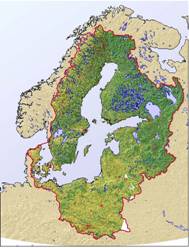
http://www.grida.no/baltic/htmls/related1.htm
At the seminar “The Baltic Sea region cooperates: what opportunities open up for the Lithuanian business?”, in Vilnius this week, Vice-Minister of Foreign Affairs of Lithuania Egidijus Meilūnas called on businessmen, academicians and representatives from other fields to search for partners in the entire Baltic Sea region, take up new initiatives and projects.
“More active participation of Lithuanian entrepreneurs in developing new potential of the Baltic Sea region is not only welcome, but also necessary. The Baltic macro-region presents a new perspective and an opportunity for boosting our economy,” Egidijus Meilūnas said.
The Vice-Minister acquainted the participants of the seminar with the EU Strategy for the Baltic Sea Region Baltic Sea strategy, its drafting and the progress that had been made.
At the seminar, speeches were also delivered by Programme Director of the Swedish Agency for Innovation Systems Vinnova Karin Nygård Skalman and representatives from the Ministry of Economy, Lithuanian Innovation Centre and Klaipėda Science and Technology Park.
After the speeches, a discussion was held about how to encourage the country’s companies and entrepreneurs to more actively engage in regional cooperation.
The event took place at the ISM University of Management and Economics in Vilnius.
The EU Strategy for the Baltic Sea Region is the first in the EU’s history macro-regional strategy, which foresees specific actions in all the countries of the region: Denmark, Estonia, Germany, Iceland, Latvia, Lithuania, Norway, Poland, Russia and Sweden. The Strategy promotes political, institutional, also business and scientific cooperation aiming at increased mobility in the region, regional sustainability and sustainable growth.
When implementing the priority Action Plan of the EU Strategy for the Baltic Sea Region, Lithuania coordinates three out of fifteen priority areas. One of the priority areas that Lithuania coordinates (the seventh) is dedicated to the exploit of the potential of the region’s innovation and development.
Source: www.urm.lt
- Bookmark :
- Digg
- del.icio.us
- Stumbleupon
- Redit it
The Presidential week in pictures
- Posted by - (0) Comment
![]()
04-05-2011 |
03-05-2011 |
03-05-2011 |
02-05-2011 |
29-04-2011 |
27-04-2011 |
- Bookmark :
- Digg
- del.icio.us
- Stumbleupon
- Redit it
Thousands of Jews march in Poland and Lithuania to honour Holocaust victims
- Posted by - (0) Comment
![]()

Participants of the traditional March of the Living start their march at the former Auschwitz Nazi Death Camp in Oswiecim, southern Poland, Monday, May 2, 2011. Thousands of people from around the world take part in the annual March of the Living, paying tribute to the victims of the Holocaust at the former Nazi Death Camp Auschwitz-Birkenau. (AP Photo/Bela Szandelszky)
By The Associated Press
WARSAW, Poland — About 7,000 Jews marched to the former German Nazi death camp of Auschwitz on Monday in memory of the 6 million Holocaust victims.
Participants in the 20th annual March of the Living were carrying Israeli flags. They started from the former camp's gate with the infamous "Arbeit Macht Frei" ("Work Sets You Free") sign.
The crowd walked about 3 kilometres (2 miles) from the red brick buildings of Auschwitz I to the wooden barracks and gas chambers of Birkenau, or Auschwitz II, where a memorial ceremony was held at a monument to the camp's victims.
The march, which is traditionally held on Holocaust Memorial Day, also included some Holocaust survivors.
Between 1942-1945, Jews from across Europe were brought to Birkenau by rail and killed in its gas chambers. At least 1.1 million people — mostly Jews, Poles and Gypsies — died that way or from starvation, disease and forced labour at the camp that German Nazis built in occupied Poland during World War II.
The Auschwitz camp was liberated Jan. 27, 1945 by Soviet troops.
Meanwhile, in Lithuania dozens of people paid tribute to the nearly 200,000 Jews who died 70 years ago when the Nazis invaded the country.
Waving Israeli and Lithuanian flags, about 100 demonstrators paid tribute to the dead by marching to the Holocaust survivor memorial outside the capital, Vilnius.
Visiting Israeli Deputy Foreign Minister Danny Ayalon said it was important to remember the 6 million Jews murdered in Europe by the Nazis because "anti-Semitism, xenophobia and racism ... are still threatening all of us."
Some 90 per cent of the country's pre-war Jewish population of 220,000 were murdered by the Nazis and local collaborators — the country's largest loss of life in such a short time. Most of the 70,000 Jews in the capital were killed within a few months in 1941.
- Bookmark :
- Digg
- del.icio.us
- Stumbleupon
- Redit it
Imminent collapse of the Euro?
- Posted by - (0) Comment
![]()

http://www.thetrumpet.com/?q=8225.6887.0.0
Rates on Greek debt soared to an astounding 21 percent last week. The end game on the Greek debt crisis could be near. If Greece defaults on its debt, it could trigger a domino collapse across Europe. But do the strategizers behind the euro have a secret plan that could totally reform the union?
One thing for sure is that the Greek government cannot long afford to borrow money at such high rates. It is virtually locked out of the debt market. That means that sooner or later, somebody isn’t going to get paid. In this case it mostly means big banks in France, Germany, Austria and Belgium.
The consequences could easily go global. European Central Bank executive member Jurgen Stark warned on April 23 that Europe may be about to suffer a banking crisis worse than that of 2008. It “could overshadow the effects of the Lehman bankruptcy,” he warned.
Bigger than Lehman?
According to Stark, a default by Greece would be the worst option for the eurozone. This would trigger massive and immediate government spending cuts and the inevitable social unrest that would ensue.
More critically, it could easily cause lenders to balk at loaning money to other troubled states like Ireland and Portugal—causing interest rates to soar in those countries and causing them to default too. Even Spain and Italy could be pushed over the edge, which would throw the whole eurozone into question.
- Bookmark :
- Digg
- del.icio.us
- Stumbleupon
- Redit it
![]()

The death of Osama bin Laden at the hands of US forces will weaken the international terrorist network al-Qaeda in the short term, officials from the three Baltic states said Monday, DPA reported.
Estonia, Latvia and Lithuania are all NATO members, and all have forces serving in Afghanistan.
Latvian Defense Minister Artis Pabriks told the LNT television channel: "It is clear that bin Laden was one of the top leaders of his terrorist group and his death will certainly weaken the network."
While the death of bin Laden is a tactical victory, resolution of regional conflicts would also require a more strategic approach, Parbriks said.
Estonian Foreign Minister Urmas Paet told the ETV television channel that because bin Laden had been "an important symbol of international terrorism" for a decade, his death would strike a "strong blow" to terrorism.
- Bookmark :
- Digg
- del.icio.us
- Stumbleupon
- Redit it
Bin Laden’s death will “inspire confidence in the region” and encourage peace and reconciliation
- Posted by - (0) Comment
![]()

Former Lithuanian foreign minister Vygaudas Usackas
The European Union's current ambassador to Afghanistan - former Lithuanian foreign minister Vygaudas Usackas - was quoted on the website of the Lietuvos Rytas daily as saying the news of bin Laden's death would "inspire confidence in the region" and encourage peace and reconciliation.
- Bookmark :
- Digg
- del.icio.us
- Stumbleupon
- Redit it
Lithuania’s impressive recovery continues
- Posted by - (2) Comment
![]()

By Violeta Klyviene - Danske Bank
Today Lithuanian Statistics published the flash estimate of GDP growth for Q1 11. GDP unexpectedly accelerated to 6.9% y/y, significantly up from 4.8% y/y in Q4 10, seasonally-adjusted GDP increased by 3.5% q/q. The outcome was significantly higher than our and consensus forecast (5.1% y/y).
Details
Lithuanian GDP increased by 6.9% y/y in Q1 11, significantly up from 4.8% y/y in Q4 10. We expect the Lithuanian economy to grow by 4% y/y in 2011, but there is a clear upside risk to our forecast.
Assessment and outlook
The Lithuanian GDP outcome in Q1 11 was significantly higher than our and consensus forecast (5.1% y/y). Although detailed statistics have not been published yet, it looks like the Lithuanian recovery has become more broad based and was derived not only by robust export performance, but also by notable growth in private consumption. However, the impressive recovery was partially determined by the low base effect.
Regarding this year’s development we emphasise that growth might exceed our expectation (4% on average). However, Lithuanian quarterly national accounts data are characterised by significant corrections, so we are not changing our forecasts for this year until the publication of the final data for Q1 11.
The biggest risk to the economic recovery is still associated with the accelerated inflation, which is mainly determined by external factors and as a consequence cannot be handled effectively. Eurozone debt crisis risk remains relevant as well. Under the unfavourable scenario, Lithuanian will be unable to escape the negative effects of a full-scale sovereign debt crisis, but the economy fundamentally looks much stronger than a few years ago.
Otherwise such risk confirms the need to pursue fiscal consolidation targets in the medium term.
- Bookmark :
- Digg
- del.icio.us
- Stumbleupon
- Redit it
Scandinavian police wants the Baltic borders closed again, claiming that Balts account for 80% of the organized crime in the Nordic Region
- Posted by - (1) Comment
![]()
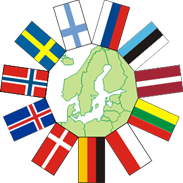
Association of the Nordic Police Corps urges the authorities to reintroduce border controls between countries in the Schengen area.
It is the growing crime rate related to the Baltic states that makes police in the Nordic region want a return to the old days when people had to go through passport control to cross borders, Norwegian newspaper VG reports.
- What happens in the Baltic countries is severe. People from these countries account for 80 percent of the organized crime perpetrated in the Nordic Region. This is a situation that we can no longer live with, "said Arne Johannessen, chairman of the Joint Police Association and vice chairman of the Nordic Council of Police Association.
He sent Wednesday a letter to Norwegian Justice Minister Knut Storberget (Ap) and the other ministers of justice in the Nordic Region with a call to close the borders.
- If the Baltic countries are not doing anything to deal with the growing crime that affects the Nordic countries to a considerable extent, the Schengen agreement and where the limits should go, taken up for serious consideration. Today's open borders is a huge problem for us in the Nordic Region, "said Johannessen. www.aftenposten.no
See also:
http://www.morski.strazgraniczna.pl/eng/bsrbcc.htm
- Bookmark :
- Digg
- del.icio.us
- Stumbleupon
- Redit it
“Yesterday Japan, tomorrow Lithuania”
- Posted by - (0) Comment
![]()
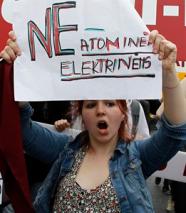
A demonstrator holds a placard during an anti-nuclear protest march in Vilnius 26 April
Demonstrators in Vilnius are protesting plans by neighbouring Russia and Belarus to build new nuclear plants near the Lithuanian border.
Ref also our article of 9 April:
| Russia’s nuclear projects: A deadly threat to energy independence of the Baltic States Text: Dr. Stan Backaitis https://vilnews.com/?p=4604 |
Some 500 protesters marched down Vilnius' main avenue, carrying signs reading "Yesterday Japan, tomorrow Lithuania," on the 25th anniversary of the Chernobyl catastrophe.
Many Lithuanians fear the Russian and Belarusian atomic power stations will be unsafe after environmental impact studies found alleged flaws in the plans.
Lithuania has long been a pro-nuclear-power nation. Before closing its Chernobyl-type reactor in 2009 it was the world's second most nuclear power-dependent nation, after France.
The 1986 Chernobyl catastrophe in the former Soviet Union is still considered to be the world's worst civilian nuclear disaster.
- AP
- Bookmark :
- Digg
- del.icio.us
- Stumbleupon
- Redit it
Information from Lithuania could have prevented the Chernobyl disaster of 26 April 1986
- Posted by - (0) Comment
![]()
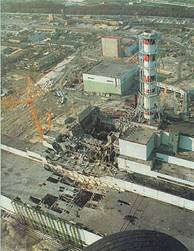
The Chernobyl nuclear reactor after the disaster. Reactor 4 (center). Turbine building (lower left).
Reactor 3 (center right).
http://en.wikipedia.org/wiki/Chernobyl_disaster
Kiev - The Soviet-era reactor used at the Chernobyl nuclear power plant contained several design flaws that contributed directly to the 1986 accident, studies have shown.
Unlike modern reactors, the one employed at Chernobyl, known as a high-power channel-type reactor (RBMK), was not designed to contain unexpected radiation leaks.
Engineers at Lithuania's Ignalina plant, who also operated RMBK reactors, had uncovered this shortcoming before the Chernobyl accident.
The Soviet government made the Ignalina findings secret, and Chernobyl engineers were not aware of it when they conducted a low- power reactor test in the early morning hours of 26 April 1986.
Most RMBK reactors were taken out of commission after Chernobyl. Russia continues to operate six, which have received upgrades in control systems, housing and safety equipment.
Sources: International Atomic Energy Agency, Ukraine's Emergency Situations and Chernobyl Ministry.
Source:
http://www.monstersandcritics.com

Radioactive fallout after Chernobyl.
- Bookmark :
- Digg
- del.icio.us
- Stumbleupon
- Redit it
![]()
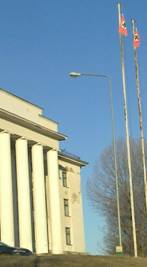
Nazi flags again raised in Vilnius.
Picture source
http://pilietis.delfi.lt/news/ahitlerio-gimimo-diena-vilniuje-iskeltos-treciojo-reicho-veliavos.d?id=44607483
VILNIUS (AFP)---Lithuanian authorities slammed a string of incidents where anti-Semitic slogans were found near a synagogue in Kaunas and Nazi German flags raised in Vilnius to mark the 122nd birthday of Adolf Hitler on the 20th of April
"We strongly condemn the display of Nazi flags and slogans," Lithuania's foreign ministry said in a statement.
"They are an attack on the Lithuanian state and civil society. They incite hatred toward the Lithuanian Jewish community and should be treated as a provocation against Lithuania," it added.
Irene Degutiene, the speaker of parliament, said in a separate statement that she "resolutely condemns such repeated racist and chauvinist attacks" and hoped the masterminds and perpetrators would be caught and punished.
"Such incidents serve to discredit any healthy patriotism and nationalism," she said on the parliament's website.
Early Wednesday, three flags with Nazi Germany's swastika symbol were found raised on a hill close to the centre of the capital Vilnius and another one on a bridge on the city's outskirts, police said.
The other incident occurred in Lithuania's second city, Kaunas, where "Hitler was right" in Lithuanian and the German-language "Juden Raus" (Jews out) were found on a banner left near a synagogue.

This banner was found at a Kaunas Synagogue, saying "Hitler was right" in Lithuanian, and in German, "Juden Raus" (Jews out)
Source: Lituvos Rytas
http://www.lrytas.lt/-13032829551301681630-kaune-prie-sinagogos-neonaciai-pakabino-plakat%C4%85-su-%C5%A1%C5%ABkiais-juden-raus-ir-hitleris-buvo-teisus-papildyta.htm
Lithuania was once home to a thriving Jewish community of 220,000, with
Vilnius a hub of learning known as the "Jerusalem of the North". But 95 percent of Lithuania's Jews perished during the country's 1941-1944 German occupation at the hands of the Nazis and Lithuanian collaborators who saw Hitler as a bulwark against the Soviet Union.
Today there are around 5,000 Jews in Lithuania, of whom around 500 live in Kaunas, according to Lithuanian-Jewish community organisations.
Nazi Germany dictator Hitler was born in 1889 and killed himself in 1945 just days before his regime's defeat in World War II. His birthday on 20 April is seen as a key commemoration day by neo-Nazis around the world.
- Bookmark :
- Digg
- del.icio.us
- Stumbleupon
- Redit it
Lithuanian lawmakers get even more gay hostile
- Posted by - (1) Comment
![]()
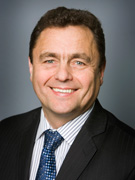
The author of the anti-gay law, Parliament Member Petras Gražulis
Lawmakers in Lithuania's Committee on Legal Affairs voted last week to make even more stringent censorship legislation, saying that they should be able to fine people for the "propagation of homosexual relations" in public. This has earned condmentation from EU groups who say this is just another step in furthering a ultra conservative, anti-LGBT agenda.
From UK Gay News:
"This is a one more warning act of institutionalised homophobia which prevails among Lithuanian lawmakers," commented Valdimir Simonko, chair of the national LGBT advocacy association Lithuanian Gay League (LGL).
"Such kind of legislative proposals are totally unacceptable in the context of the legally binding Charter of Fundamental Rights which clearly prohibits any discrimination on the ground of sexual orientation.
"We urge European Commission as the guardian of the Lisbon Treaty to intervene immediately," he pleaded.
Lawmakers have attempted to raise support among orthodox religious groups, asking that they publicly encourage parliamentarians to approve the changes.
In a letter to church leaders legislators said that these laws are necessary in combating "forms of sinful lifestyles" present in society, adding: "the ideology of homosexuality is one such form and is unacceptable to believers, contradicts the concept of the family, the marriage of man and woman, the natural law established by the Creator, the Constitution which considers family the foundation of the Lithuanian state, and the catechism of the Catholic Church which emphasizes that homosexual relations contradict the natural law and close the sexual act to the gift of life. In addition, we can state that this position of the Church also arises from the notion of homosexuality as a grave perversion in the Bible.”
The letter also says that freedom for citizens should not be misinterpreted as allowing for the degradation of family, hinting that freedom must be curtailed when citizens risk going astray from the ideal of family life.
Lithuania has already raised the ire of the international community for proposing a complete ban on gender reassignment surgery for trans people so as to negate a European Court of Human Rights ruling.
Its censorship law, that this change would aim to add to, has also been widely criticized for its overreaching nature and the way in which it not only bans the ill-defined term propaganda but is also being used to stifle free speech.
This move will likely add to the protestations that Lithuania should have its power as a member state of the EU curtailed until such a time when it is willing to work within the limits and responsibilities of international law.
You can read more on Lithuania's proposed ban on gender reassignment here.
- Bookmark :
- Digg
- del.icio.us
- Stumbleupon
- Redit it
Crisis over?
- Posted by - (0) Comment

In its latest EU10 Regular Economic Report, the World Bank predicts that economic growth in Lithuania will be 4.3 % in 2011 and accelerate further in 2012, thanks to “low pre-crisis imbalances, deep integration into European production networks, EU funds and solid consumption”.
The bank predicts Lithuania’s growth to be on the very top amongst the EU10 countries.
According to the bank, Lithuania, Estonia and Latvia are likely to build on the export-led upswing as domestic demand continues to recover, with growth of from 3.3 to 4%.
Romania and Bulgaria, where the crisis hit later than elsewhere, will recover some of the lost ground, with growth set to accelerate in 2012 to 3.4% in Bulgaria and 4.4% in Romania.
The performance of Slovakia and Poland is set to remain solid thanks to low pre-crisis imbalances, EU funds, and, in the case of Poland, solid consumption. Growth rates will top 4% both in 2011 and 2012,
Finally, growth in Hungary and Slovenia is likely to increase at a more measured pace of between 2.2 and 3, while the Czech Republic is set to witness a slowdown.
Despite the favorable economic outlook, the EU10's growth prospects remain subject to risks, the study stresses.
"By the end of 2010, only exports had recovered to pre-crisis levels. Private investment remains weak in view of feeble demand, the winding down of construction projects and tight international financial conditions. (..) In addition, the EU10 recovery is still jobless, as labor markets continue to be slack," the World Bank report said.
The EU10 Countries
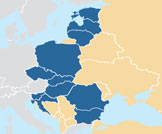
Eight Central European countries joined the EU in 2004: the Czech Republic,Estonia, Hungary, Latvia, Lithuania, Poland, the Slovak Republic and Slovenia. Bulgaria and Romania joined the EU in 2007. Croatia began EU accession negotiations in October 2005.
- Bookmark :
- Digg
- del.icio.us
- Stumbleupon
- Redit it
Arturas Zuokas elected Vilnius mayor
- Posted by - (0) Comment
![]()
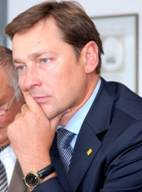
The Vilnius City Council has voted Arturas Zuokas as the new mayor of the capital city, a position he also held from 2000-2007.
Zuokas' return to the post marks an incredible turnaround following a bribery conviction in 2008.
Zuokas, the former leader of the Liberal and Centre Union, secured 26 out of 51 votes in the council on April 19. In the municipal elections earlier this year he received the most mandates in the city, making him a leading contender for the mayor's post despite his bribery conviction.
Source: http://www.baltictimes.com/news/articles/28488/
- Bookmark :
- Digg
- del.icio.us
- Stumbleupon
- Redit it
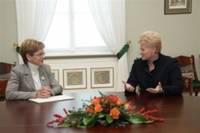
Poland’s foreign ministry expressed this week concerns about ‘a growing atmosphere of enmity between the two neighbouring countries’ to Lithuania’s ambassador to Poland, Loreta Zakarevičienė, here with President Dalia Grybauskaitė
Poland's foreign ministry summoned the Lithuanian ambassador in Warsaw on Tuesday to express concern over the treatment of its Baltic neighbour's Polish-speaking minority.
The move is the latest sign of increased tensions between the two countries, which are both members of the European Union and of NATO, over a growing list of complaints, including the treatment of ethnic Poles and Polish investors in Lithuania.
The ministry said it had expressed concern to Ambassador Loreta Zakareviciene about "a growing ... atmosphere of enmity" in Lithuania towards its Polish-speaking population.
Vilnius has already distanced itself from recent nationalistic comments by some Lithuanian educators cited by Poland.
"We should not let radicals prevail. The (Lithuanian) government wants emotions to be left aside, so the normal dialogue (with Poland) continues," said Virgis Valentinavicius, a spokesman for Lithuania's prime minister.
The two countries have had generally friendly ties since the fall of communism in 1989 and Lithuania's regaining of its independence in 1991 after the collapse of the Soviet Union.
But Warsaw has long fretted about the rights of the Polish minority in Lithuania, which makes up around 7 percent of the small Baltic republic's population, over issues ranging from the spelling of Polish names to land disputes and education.
Tensions have been exacerbated by complaints from Poland's top refiner PKN Orlen (PKNA.WA: Quote), which is considering selling its Lithuanian unit, accusing Vilnius of failing to ensure it more accessible oil supplies.
Source:
http://af.reuters.com/article/energyOilNews/idAFLDE73I1O620110419
- Bookmark :
- Digg
- del.icio.us
- Stumbleupon
- Redit it
Open letter in commemoration of the first anniversary of the death of Lech Kaczyński, President of the Republic of Poland
- Posted by - (0) Comment
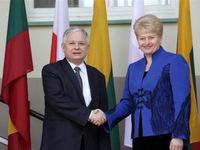
President of Poland Lech Kaczynski on a visit to Lithuanian President Dalia Grybauskaitė in April 2010, just a few days before his tragic death
The below letter was signed by:
Antanas Gailius; Dr. Irena Vaišvilaitė; Prof. Alvydas Jokubaitis; Dr. Paulius V. Subačius; Prof. Danutė Gailienė; Rev. Julius Sasnauskas OFM; Prof. Rimvydas Petrauskas
The letter was written in Polish, translated to English by Lithuanian MP Mantas Adomenas
“It is with burning concern and sorrow that we observe in Lithuania the daily destruction and disdain of the seeds of the European Christian civilisation: the virtues of wisdom and tolerance, humility and the love to one’s neighbour. Several years ago, it would have been hardly credible that unsound conspiracy theories, ill-founded or even deliberately misleading and mischievous statements that are abundant today with reference to the relations between Lithuanians and Poles could become the focus of state politics and a determining factor in the bilateral relations.
We are alarmed by the growing radicalisation and polarisation of society, as well as by the manifestations of pseudo-patriotism, such as witnessed during the 11 March procession. The chauvinist version of history which considers the shared history of Lithuania and Poland as the ‘lost centuries’ distorts the vision of the past, rejects and smears the common spiritual, political, and cultural heritage of the two nations – from the Battle of Grunwald to the Constitution of the 3rd of May, from Our Lady at the Gate of Dawn to the joint struggle against the enemy of the two nations, both in 1863 and in 1989.
We embarked on the 21st century having overcome, it seemed, the quarrels of the past and having preserved the brotherhood of the two Christian freedom-loving nations. Now we must put every effort in order to safeguard this peace and unity. Our common faith obliges us to seek peace. Therefore, more than ever should we recall the words of the Apostle who said that “there is neither Jew nor Greek” in the eyes of the Church and faith. Lithuanian citizens of the Polish origin who consider themselves Poles constitute an integral part of the Lithuanian society and the state.
We lived, we live, and we will continue to live together with them. Radicalism will not help us find a common ground or jointly build our common state. On the contrary, it promotes distrust and hostility and prevents the possibility of peace. We invite everyone to surmount political discord, extinguish the fire of polarisation that is often fuelled by short-lived political ambitions, and seek agreement with the Lithuanian Poles as our fellow citizens who, like everyone else, want to live their lives and build their future, as well as that of their children, in peace and harmony on this soil.
Our ability to live with Poles in concord demonstrates our maturity and Europeanism. Being the larger community we are obliged to offer our hand first and to start the process of reconciliation, which will not be easy and will require much effort. The approaching holiday of the Resurrection urges us to seek concord, for how will we be able to celebrate Easter without having reconciled us with our neighbours?”
Vilnius, 10 April 2011
Read more at:
http://www.economist.com/blogs/easternapproaches/2011/04/poland_and_lithuania_rare_bit_good_sense
- Bookmark :
- Digg
- del.icio.us
- Stumbleupon
- Redit it
VilNews e-magazine is published in Vilnius, Lithuania. Editor-in-Chief: Mr. Aage Myhre. Inquires to the editors: editor@VilNews.com.
Code of Ethics: See Section 2 – about VilNews. VilNews is not responsible for content on external links/web pages.
HOW TO ADVERTISE IN VILNEWS.
All content is copyrighted © 2011. UAB ‘VilNews’.

 Click on the buttons to open and read each of VilNews' 18 sub-sections
Click on the buttons to open and read each of VilNews' 18 sub-sections 





















.jpg)



